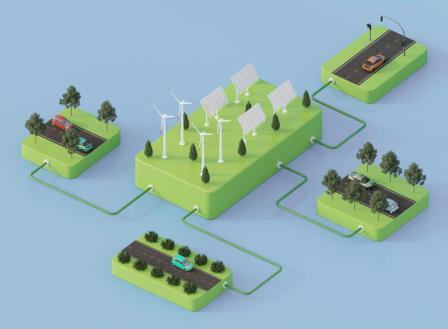Reducing carbon emissions and combating climate change have become more pressing than ever. The search for cleaner and sustainable energy sources intensifies as traditional fossil fuels continue contributing to the escalating environmental crisis. Biofuels, derived from organic matter, present a promising solution.
Current Initiatives
Advait Infratech, a leading player in the energy sector, is actively involved in green energy projects. The ongoing Microgrid project for a Public Sector Undertaking (PSU) in India, set to be commissioned by December this year, highlights the company’s expertise and capability to deliver successful projects within defined timelines. Moreover, Advait Infratech’s collaboration with the Gujarat Government in formulating a state policy on Green Hydrogen further emphasizes the favourable regulatory environment and the Indian government’s commitment to promoting sustainable energy initiatives.
The Potential of Biofuels
Biofuels offer significant potential for reducing carbon emissions due to their renewable nature. By utilizing organic feedstock such as crops, forest residues, and algae, biofuels can replace conventional fossil fuels in various sectors, including transportation and power generation. According to the International Energy Agency (IEA), the use of biofuels can reduce CO2 emissions by an estimated 2.1 gigatons per year by 2050, representing a considerable step towards meeting global climate goals.
The Potential of Biofuels in the Power Grid
Biofuels hold immense potential in the power grid sector, presenting an opportunity to reduce carbon emissions and transition towards cleaner energy sources. By utilizing organic feedstock such as crops, forest residues, and even algae, biofuels can substitute traditional fossil fuels in power generation. This shift can significantly decrease carbon emissions associated with electricity production.
Bioenergy and Biomass Power Plants:
ctricity. By replacing fossil fuel-based power plants with bioenergy facilities, substantial reductions in carbon emissions can be achieved. According to the International Renewable Energy Agency (IRENA), biomass power generation accounted for 96.6 GW of global installed renewable capacity in 2019, avoiding nearly 539 million tons of CO2 emissions.

Transportation Sector Transformation:
The transportation sector is one of the largest contributors to greenhouse gas emissions. However, biofuels have the potential to revolutionize this sector. Bioethanol and biodiesel, two widely used biofuels, can be blended with gasoline and diesel or used as standalone fuels in flexible-fuel vehicles. Sustainable aviation fuels (SAFs), derived from bio-based sources, can significantly reduce carbon emissions in the aviation industry. Using SAFs can lead to a 70-80% reduction in lifecycle carbon emissions compared to conventional jet fuel. Similarly, biofuels in the marine sector, such as biodiesel and biogas, offer a cleaner alternative to fossil fuels, contributing to a more sustainable shipping industry.
Biogas for Power Generation:
Biogas, a biofuel produced through the anaerobic digestion of organic waste, offers a viable option for electricity production. Landfills, agricultural waste, and wastewater treatment plants can be harnessed as biogas sources. By capturing and utilizing this methane-rich gas, renewable energy can be generated while reducing potent greenhouse gas emissions. Biogas plants have proven to effectively reduce carbon emissions in the power sector, particularly in decentralized settings.
Challenges and Considerations:
While biofuels present a promising pathway for reducing carbon emissions in the power grid, several challenges and considerations must be addressed. One key challenge is the availability and sustainability of feedstock. Fuel demand must be balanced with responsible land use, avoiding competition with food production and conserving ecosystems. Advanced technologies, such as second-generation biofuels derived from non-food feedstocks like algae and waste biomass, hold promise in addressing these challenges.
Infrastructure and Integration:
Another significant challenge is the integration of biofuels into existing power grid infrastructure. Upgrading power plants and distribution networks to accommodate the use of biofuels may require substantial investments and modifications. Additionally, the intermittent nature of certain bioenergy sources, such as solar thermal and biogas, necessitates efficient energy storage systems and grid balancing mechanisms to ensure a stable and reliable power supply.
Conclusion:
Biofuels offer a promising avenue for reducing carbon emissions in the power grid, revolutionizing how we generate electricity. Advait Infratech’s involvement in green energy projects and collaborations with the Gujarat Government highlights the commitment to transitioning to a sustainable energy future in the upcoming years.

Shared By : Rutvi Sheth,
Director of Media,
Advait Infratech





